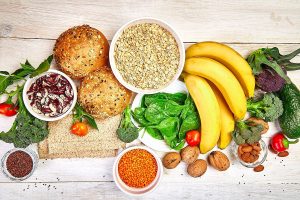Everyone knows that a weekly trip to the grocery store is necessary for cutting down costs, but it often seems like fresh produce turns faster than we have the ability to eat it. What gives? It can be incredibly frustrating watching fruits and veggies sour too quickly. Sometimes we simply miscalculate the week and don’t have the time to cook everything before it expires.
Here are a few tricks we’ve gathered from moms (they still know best), friends, and the internet.
1. One bad apple has the ability to turn the entire bunch. This isn’t just a saying. As they ripen, some fruits, like apples and pears, produce a gaseous hormone called ethylene, which is (among other things) a ripening agent. When you store fruits together, the ethylene each piece emits has the potential to turn the others. So, if you spot one going bad do the bunch a favor and eat it, toss it, or chop it and up and add it to a smoothie.
2. Rinse your berries in apple cider vinegar. Berries are best when they are ripe, fresh, and oozing with flavor, but they can get a little fuzzier than expected in no time. So when you get your berries home, prepare a mixture of one part vinegar and ten parts water. Toss the berries into the mixture and swirl around. Drain, rinse, and pop in the fridge. The vinegar kills any bacteria or mold that causes the berries to rot quickly.
3. Logic leads us to believe that refrigerator storage is key to freshness, but this is not the case across the board. To make tomatoes last the week, store them outside the fridge.
4. If the week gets in the way, and you know you aren’t going to be able to out-eat your spoiling produce, don’t wait for mold to do its dirty work. Chop and freeze your produce. Anything from bananas to bell peppers can be peeled, chopped, and put in a freezer lock bag.
5. There is a reason almost all stores have started selling mushrooms in brown cardboard. Mushrooms should never be placed in plastic. Keep them in their cardboard, or if you don’t love the idea of open produce in the fridge, put them in a brown paper bag.
6. Asparagus are expensive, so you don’t want them going bad too quickly. Your best bet is trimming their ends and placing them in a cup/vase/mason jar with a little bit of water, and storing in the refrigerator. Treat them like flowers and you’ll be sure to enjoy them longer.
7. Carrot tops may be fluffy and pretty, but you should chop them off before you store them in the refrigerator in a plastic bag (perforated if possible). Vegetables like to breath and if they get to a point where they release gas, if their compatriots are trapped in a sealed bag with them, the whole army will take a hit.
8. Invest in a bread box. No one likes to see little mold spores pop up in on the edges of bread or bagels. Some folks like to put their bread in the fridge, but this actually promotes drying, and can change the flavor. A bread box allows for safe storage and a good bit of air flow. If you know you can’t eat it, freeze it. Just make sure the bread is in a freezer tight bag. Or make bread crumbs. Save them for the next time you need to make stuffing!
9. Cheese should not go in the chill drawer, but rather the warmest part of the fridge. Another good investment is cheese cloth. Cheese is an expensive item and not something you like to see mold quickly. A cheese cloth is a breathable alternative to plastic. Wax paper is also a great alternative.
10. Last but not least, always make a list. You hear it time and again, and life gets in the way and we don’t do it. A list will ensure you only get what you can eat.–Arianna Schioldager



















This information was very helpful, thank you, much….